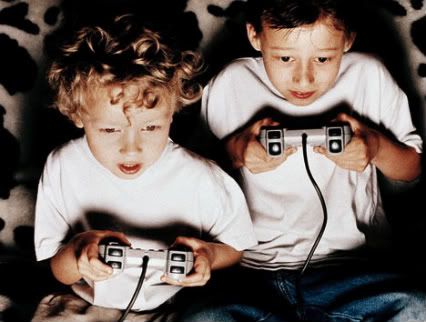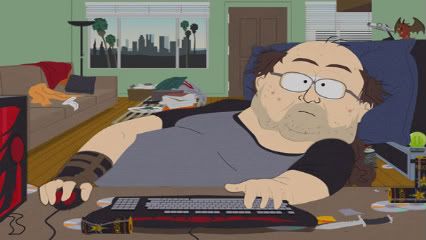 I’ll start this article with a disclaimer – to truly examine the relationship between gaming and mainstream media, it’d probably take a University thesis, around 756 cigarettes, twelveteen source books and an ungodly amount of coffee. Instead, this article hopes to look at how gaming has been portrayed in the media recently and hopes to draw a few conclusions as to the relationship between the two.
I’ll start this article with a disclaimer – to truly examine the relationship between gaming and mainstream media, it’d probably take a University thesis, around 756 cigarettes, twelveteen source books and an ungodly amount of coffee. Instead, this article hopes to look at how gaming has been portrayed in the media recently and hopes to draw a few conclusions as to the relationship between the two.
Games have been in the newspapers, radio and on the TV a lot recently, these mediums are what I refer to when I say mainstream. They are the sources of news and information that people have relied on for decades and they are the watermark for what’s acceptable and what gets talked about in British society. You might think then that games have made a breakthrough, that finally they’re getting the attention they warrant as one of the largest and fastest growing industries on the planet. That finally, grudgingly, games and consoles are being accepted as a valid form of entertainment, rather than being perceived as an evil box that warps the minds of our children and turns them into murderous social degenerates.
But that’s not entirely true. The increasing profile of games, whilst no doubt good for the industry in the long run, opens up old wounds in terms of games being an easy target. High profile publications such as the Daily Mail gave the gaming industry both barrels back in October as word began to spread about the controversial ‘No Russian’ level present in Modern Warfare 2. MP and Critical Gamer Interviewee Tom Watson sprang to the defence of the industry in the House of Commons, but the Daily Mail article is symptomatic of the way games are perceived in some sections of the media and the establishment.

Whatever game he's playing must be awfully green
Games are too violent
The problem is multi-faceted. Lets start by looking at the most simple of reasons. The words Games, Videogames and Gaming are not exactly helpful. They sound like toys for children and hence you’d think it was reasonable to regard them as such. But the level of blood, violence and more recently sex in games clearly marks them as an adult form of entertainment. Unfortunately the ‘for kids’ label isn’t cast aside so easily, especially with the high number of children that play games. The fact is many of today’s gamers are people who played games as children, rather than growing up and moving away to more traditional ‘adult’ pursuits of entertainment – Theatre, Art, Knitting etc – they retained their fondness for gaming and the industry has grown up with them.
Games are long past the stage where they existed primarily as a child’s toy and that’s reflected in the majority of major titles released today. So the issue arises that certain sections of the media and the people whose exposure to games largely comes from that media, have a perception of games and gaming that is erroneous. The knock on effect being parents buying their children products that are clearly intended for adults and containing unsuitable content. This is what gives rise to a high number of the articles and condemnations of games to be found in the mainstream and at a basic level it’s due to ignorance and misrepresentation.
The second argument surrounding violence in games comes from the stories we hear about impressionable young people who play games and then commit acts of violent crime. Far be it from me to declare myself an expert in psychoanalysis and claim understanding of the thought processes of these individuals; yet common sense would dictate that to place the blame solely upon games is a gross oversimplification. It would seem more reasonable that games can – as can books and music and film – act as a conduit for people to live their lives through a proxy, where they can project their feelings onto the screen and act out violent fantasies. But to say that games made a person this way or that games spurred on the violent act ignores the fact that most of these people must already have quite severe mental health issues or feelings of crushing alienation.
Perhaps for such people games are not exactly a healthy hobby to engage in, yet you cannot simply ban everything in the hope that impressionable minds will be spared. What can be done is that parents and media outlets can be aware of the content of a game and represent it in the proper manner. Games have a ratings system that is enforceable by law, by making sure that all parties are aware of the content and indeed the target audience for a game, it would help to stop those impressionable minds from bearing witness to something that is patently not intended for them to see. At least until they are of an age where you might hope they have the maturity to process it in the normal manner – as fictional pieces of entertainment that do not have a bearing on, nor should influence the way we act in, real life.

An accurate representation of the average WoW player or tongue in cheek satire? You decide!
Gaming is addictive and anti-social
We hear regularly of the latest report either confirming or debunking the idea of games addiction and how the playing of games is an anti-social activity. For instance last week we heard of how Andy Murray’s girlfriend left him, because of his 7 hour a day PS3 addiction. The truth is, if you can’t indulge in your hobby in moderation, then it’ll likely come back to bite you in the arse at a later date. This doesn’t only apply to gamers, it applies to bedroom DJs who’ll alienate their neighbours with loud music and to fishermen, who’ll begin to smell of river water and get infections (I’m operating on the assumption that every river is as nasty as the River Wear here), the anorak wearing train-spotter who’ll forever be mocked for his hobby with choice. My tongue is lodged firmly in cheek here, but the point I’m trying to get across is that – Yes, if you overindulge in a hobby and allow your social life and personal hygiene to suffer to an unacceptable level, then it’s probably time to tear yourself off the couch and reintroduce yourself to daylight.
Yet despite the common sense approach most of us take to gaming, the reports have persisted. Klaus Woelfling, a psychologist and director of the Clinic for Gaming Addiction at the University of Mainz earlier this year reported that gamers can display symptoms consistent with withdrawal from drug usage, when deprived of games. Furthermore in England you can now go to a rehab clinic to be treated for your games addiction. That is – if you’ve got wads of cash you’re ready to waste on having someone tell you to be a bit more sensible.
The anti-social argument is a little harder to pin down. If like Andy Murray you’re completely ignoring your girlfriend in favour of shooting people in the face then perhaps there’s something in it. But games needn’t necessarily be anti-social. In fact they can bring people together in all sorts of ways. For instance think of the group of friends who leave their home-town to go university. Sure they can keep in touch via Facebook, but even better they can log into Left 4 Dead using their headsets and have a blast as they romp through the zombie filled campaigns. Think too of the many stories we hear of WoW marriages and the like, people who may lack certain skills or be overcome by shyness in the real world, have through WoW the chance to meet people with the same interests. Games can allow people with a lack of self confidence to feel good about themselves and to present themselves as they wish to be seen, with bonds of friendship being formed with complete strangers from around the globe. So while I agree that an excess of gaming can be anti-social, I also believe that games and gaming can act as a valuable tool for socialising.

Andy Murray celebrating a Killstreak of 14
Games lack the art and the status of other forms of entertainment
I’ll be brief here, because my editor will kill me if I start writing about ‘whether gaming is art’. But that’s not that point I was intending to make anyway. Instead I simply want to highlight the differences between the ways games are treated and the ways in which other mediums – in particular films – are treated. It is often argued that games fail to garner artistic recognition outside of their own industry, that the wider press have little time for what they see as a frivolous and perhaps childish activity. Games are predisposed towards being violent and filled with explosions, with narratives often being tacked on. However that has in the past not harmed the reputation of many films of the action genre. Films from the 90′s such as Die Hard or Terminator 2 are now regarded as modern classics, showcasing the perfect blend of action and well written dialogue, often aped in games. Yet while watching Die Hard might be seen as a perfectly adult and suitable way to spend an evening, stick a game – lets say Uncharted 2 – on and suddenly it’s a waste of time and too violent. It’s true that perhaps the majority of games still feature poor writing and some plots feel as though they’re superimposed over the levels to glue them together. But I’d still rather play Bioshock and explore the sights and sounds of Rapture, as Andrew Ryan and Atlus fight over my soul, than watch Michael Bay’s latest nonsensical explodarama.

Jack Black as Brutal Legend's Eddie Riggs
Perhaps then what games lack is the celebrity and star power that exist within other forms of entertainment. Few games have big name stars ready to go out and sell their games on prime-time television or radio and few developers are cut from the same cloth as actors or musicians who are often natural showmen or women. But then again perhaps the times are a-changing. Brutal Legend which was released in (R)Oc(k)tober not only had Jack Black willing to dress up as main character Eddie Riggs, but netted Tim Schafer a spot on Jimmy Fallon’s late night chat show. Modern Warfare 2 released here in the UK with a star-studded première party, the likes of which are usually reserved for films. Plus who can forget seeing the Beatles up on stage at E3, there to promote Beatles: Rock Band.
So while this article has largely focused on the negative appearance of games and gaming in the mainstream, there have been positive signs too. Charlie Brooker’s Gameswipe was a rare thing, an intelligent and most definitely adult television show that examined gaming, tailored for a wider audience. It may have been a one off show, and it may have been tucked away on BBC Three, but it sat pretty at the top of the BBC iPlayer chart.
As gaming continues to grow and we have new generations of gamers reaching adulthood and maintaining their hobby, it will be more and more difficult for the mainstream to ignore and criticise our electronic pastime. With groups such as Gamers’ Voice pushing for a fairer representation of the industry in government, it can only be a matter of time before the media at large follows suit. Who knows, once gaming is no longer dismissed as childish, the games we see may mature in tandem and then we’ll be in for a treat.
Additional Sources:
http://news.bbc.co.uk/1/hi/england/leicestershire/3934277.stm,
http://www.mcvuk.com/news/36327/Games-rehab-centre-opens-in-UK
http://www.tgdaily.com/games-and-entertainment-features/43378-computer-games-as-addictive-as-drugs













Another thing that irks me with tabloid journalism in particular, is that some, so called reviews, look like they have been taken straight from a press release. When you see games like Crazy Frog Racer getting 5 stars you know something is wrong!
Very good contribution I love this site, I can not stop looking at each
one of the post